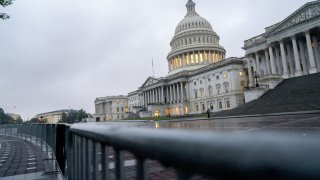
- Washington and Wall Street were optimistic Monday that Congress can pass a bill to fund the government and avert a partial shutdown before a Friday deadline.
- Democrats and Republicans appeared to be coalescing around a bill to fund the government through late January or early February, a personal familiar with the discussions told CNBC.
- A lapse in government funding can lead to furloughs of federal workers and a lapse in some government services.
- Congress has a long list of priorities in the coming weeks, including funding the government, raising or suspending the debt limit, the annual defense budget bill and Democrats $1.75 trillion Build Back Better Act.
Washington and Wall Street were optimistic Monday that Congress can pass a bill to fund the government and avert a partial shutdown before a Friday deadline.
It was unclear for how long lawmakers would try to keep the government running. Democrats have a list of priorities in the coming weeks as they try to avoid a shutdown, pass their $1.75 trillion Build Back Better bill, boost the debt limit and approve a new defense budget bill.
Congressional staff and Washington policy analysts who spoke to CNBC on Monday sounded hopeful about Congress' chances to pass a temporary spending plan known as a continuing resolution. Failing to pass legislation before the end of Friday could trigger furloughs of government workers and a lapse in some federal services.
Get Connecticut local news, weather forecasts and entertainment stories to your inbox. Sign up for NBC Connecticut newsletters.
As of noon ET Monday, Democrats and Republicans appeared to be coalescing around a bill that would fund the government through late January or early February, a person familiar with the discussions told CNBC. The chief negotiators are confident they can reach a deal to avoid a shutdown before time runs out, another aide said.
Those people asked not to be named in order to speak openly about ongoing and private talks between party leadership.
Some on Wall Street shared the optimism.
Money Report
"The good news is that both sides of the aisle want to avoid a government shutdown and Republicans seem unwilling to mount a filibuster that could delay a spending bill. The open question that should be resolved before Friday is how long the next CR will be," Tom Block, Washington policy strategist at Fundstrat Global Advisors, wrote in an email Monday morning.
He explained that some Democrats want to extend government funding by a matter of weeks to force Congress to make more significant changes to spending priorities in the current fiscal year. If lawmakers pass a continuing resolution for a longer period of time, it would lock in spending at current levels.
However lawmakers decide to proceed, Senate Majority Leader Chuck Schumer, D-N.Y., will need to convince Senate Minority Leader Mitch McConnell, R-Ky., to pass a continuing resolution by the end of the week. Senate Republicans are not expected to oppose a short-term funding bill just ahead of the year-end recess.
"After the House takes action this week, the Democratic Senate will move forward to make sure the government remains funded after the deadline," Schumer said Monday afternoon. "It's important to get it done, and we are working to get it done."
A representative for McConnell said negotiations are ongoing but declined to comment further.
A spokesman for House Speaker Nancy Pelosi, D-Calif., did not reply to a request for comment. A report Monday morning from Punchbowl News suggested the chamber's Democrats could introduce a stopgap funding bill Tuesday and vote on it as soon as Wednesday.
While the government shut down twice under former President Donald Trump, Republicans and Democrats usually agree that Congress should keep the federal government running.
The two parties often split on proposed additions to otherwise "clean" funding bills, which generally do not include unrelated provisions. That happened in September, when Democrats tried to link government funding legislation to a debt limit increase.
Shutdowns often cause the departments of Housing and Urban Development, Education, Interior, Labor and Commerce to send home most of their workers until Congress approves a new funding bill.
The government funding negotiations are distinct from thornier debates around how to suspend or increase the U.S. debt limit. Treasury Secretary Janet Yellen has warned lawmakers that the government could exhaust its ability to pay the nation's bills as soon as Dec. 15.
If the Treasury Department is unable to honor its regular debt payments, the U.S. would default for the first time. Yellen has warned that a default, while unlikely, would lead to a recession and a spike in interest rates. It could also undermine the U.S. dollar's role as the globe's reserve currency.
Efforts to lift the debt ceiling in recent months have led to bitter fights between Republicans and Democrats.
Republicans have refused to vote to increase the limit. They have argued that Democrats should be responsible for lifting the cap since they control Congress and are acting alone to pass their $1.75 trillion package that would address education, health care and climate policy, among other issues.
Democrats note that raising the debt ceiling does not authorize additional spending of taxpayer dollars. Yellen explained in September that, even if the Biden administration had not authorized any spending, Congress would still need to raise the borrowing limit.
Congress voted to suspend the debt limit three times during the Trump administration.
Schumer and McConnell met earlier this month to discuss year-end legislation including the debt limit, NBC News reported. McConnell told reporters following that meeting that the pair "had a good discussion about several different issues" and that they agreed to "keep talking and working together."






